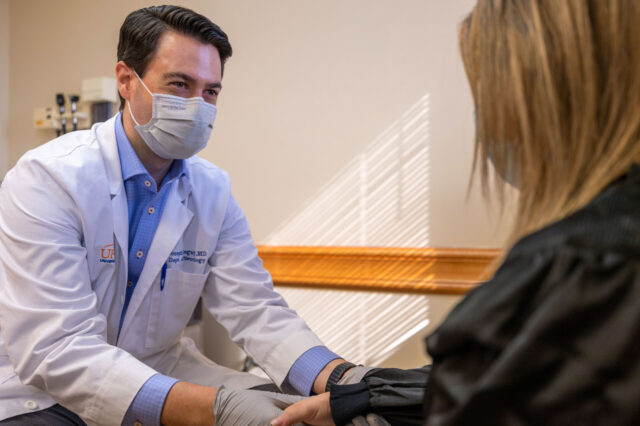Parkinson's disease and movement disorders

The Movement Disorders and Parkinson's Program at the UF Health Neuroscience Institute at Jacksonville provides comprehensive treatment of Parkinson's disease and other types of movement disorders.
The center is staffed by faculty neurologists of the University of Florida Department of Neurology who are fellowship-trained in movement disorders. A full-time nurse coordinator educates patients and caregivers and assists in patient care. Physicians, pharmacists and nurses provide patients with medication management and education. A full-time research assistant evaluates interested patients for clinical research studies.
Our expertise
The Movement Disorders and Parkinson's Program provides:
- Sophisticated methods for diagnosis and treatment of all types of movement disorders
- State-of-the-art neurosurgical procedures for medically refractory cases
- Expert medication management
- Supportive physical and exercise therapy designed to increase balance and overall function
- Speech and occupational therapy
- Psychological counseling to patients and caregivers
- Educational and support group programs
- The latest clinical drug trials

Movement disorders we diagnose and treat
Accurate, early diagnosis allows implementation of effective treatments that positively impact the patient's movement disorder and quality of life. Diagnostic studies include brain imaging, specific blood tests and neurophysiological testing.
Common movement disorders diagnosed and treated include:
- Parkinson's and other neurodegenerative diseases
- Dystonia (torticollis, hemifacial spasm, blepharospasm, focal dystonia)
- Tremors
- Huntington's Chorea
- Tic disorders
- Psychogenic movements
Physicians in the Movement Disorder and Parkinson's Program perform a detailed neurologic and medical history utilizing a comprehensive review of patient symptoms. Patient symptoms may include tremors, rigidity, loss of balance, changes in gait, slowness of movement, abnormal and involuntary movements of the limbs, trunk or body, involuntary muscular contractions and speech difficulties. Patients are diagnosed through an in-depth evaluation that includes a complete physical examination and detailed neurological assessment.
Our treatment options
- Medication management - Medication management is performed by the physician, nurse and pharmacist team using a specific regimen tailored for each individual patient. Patients are given verbal and written instructions with medication flow sheets and information about the benefits and potential side effects of each medication.
- Botulinum toxin therapy - This therapy involves an injection of the protein botulinum toxin directly into spastic/dystonic muscles to lessen abnormal muscle tone or contraction. Diseases that might benefit from these injections include torticollis, hemifacial spasm, blepharospasm, dystonic tics, cerebral palsy, post stroke spasticity, multiple sclerosis, writer's cramp and chronic migraine headache.
- Clinical drug trials - Patients of the Movement Disorder and Parkinson's Program may have the opportunity to participate in clinical research trials to test the effectiveness of new medications and alternative therapies for a variety of movement disorders.
- Craniosacral massage and neuromuscular therapy - Massage and neuromuscular therapy is prescribed for patients suffering from muscle spasms and stiff and rigid muscles.
- Deep brain stimulation (DBS) - Patients may receive preoperative evaluation for this procedure, which involves placement of an electrode, followed by stimulation of a specific part of the brain (thalamus, globus pallidus, subthalamic nucleus). Stimulation relieves tremor in essential tremor (ET) and Parkinson's disease (PD), or rigidity, bradykinesia and dyskinesia in Parkinson's disease. DBS may be highly effective in medically refractory ET and PD patients.
- Pallidotomy - The center can assess patients for this procedure, which involves placing a small surgical probe in the globus pallidus of the brain in patients with advanced Parkinson's disease to reduce tremor, rigidity, bradykinesia and dyskinesia.
- Patient and caregiver education - Patients and caregivers receive educational materials during their first visit. Subscriptions to newsletters such as The Parkinson 's Report are also available through the center. A monthly lecture series on Parkinson's disease is held the second Wednesday of each month on the UF Health Jacksonville campus. Speakers include physicians, nurses, therapists and other health professionals. Periodic courses and symposiums on Parkinson's disease are offered to the public and medical community. A resource library with brochures, books and videos is open to patients and families during the center's regular business hours.
- Physical and rehabilitative therapies - Patients are assessed and referred for rehabilitative treatments such as physical therapy, occupational therapy and speech therapy including swallowing studies. Patients and their care partners are also referred for psychological, psychiatric or neuropsychological testing as part of a comprehensive approach to treatment.
- Support groups - Parkinson's patients and their family members receive group counseling led by licensed therapists at a monthly support group. Counseling is provided by the nurse coordinator on a one-on-one basis for patients who need help accepting their diagnosis, coping with their illness and desire more education regarding their disease state and treatment options. An early onset support group is also available.
- Yoga and tai chi classes - Parkinson's disease patients may participate in yoga and Tai Chi classes that aid in relaxation, flexibility, stress reduction and improving balance. Patients attending the weekly exercise classes also benefit through the emotional and psychological support they receive from the other class members.
Related conditions & treatments
Our experts
Community and Patient Programs: Parkinson's disease and movement disorders
Our community and patient programs provide great value to patients, families and loved ones. People can find support, educational materials, expert consultants and more. In most instances, these programs are offered free of charge.
-
Parkinson's Disease Support Group
Meets on the second Wednesday of each month, 11:30 a.m.-1:30 p.m. in the UF Health Jacksonville Towers, 580 W. 8th St.
-
Tai Chi for Neurology Patients
Tai chi classes for patients and caregivers with neurologic conditions such as Parkinson's, stroke, multiple sclerosis, epilepsy and neuropathy.
-
Yoga for Neurology Patients
Yoga classes for patients and caregivers with neurology conditions such as Parkinson's, stroke, multiple sclerosis, epilepsy and neuropathy.
